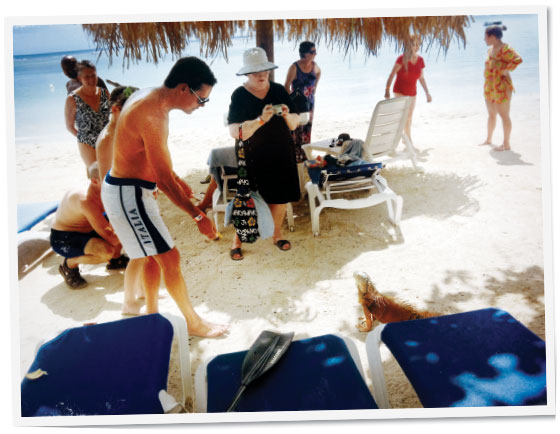
The whole thing was white, and broken, that much was clear. A week after the presidential election, when the dreams of Republicans were dashed with President Barack Obama’s victory over Mitt Romney, we were snorkeling in the blue waters of the Caribbean. In the distance was a shipwreck. “You could make out the pieces of it,” said Ralph Reed, the right-wing political operator who had bolstered the Evangelical Christian vote for Romney. “It was deep and murky.”
Jonah Goldberg, the National Review contributor and author of Liberal Fascism: The Secret History of the American Left, From Mussolini to the Politics of Meaning, also bore witness to the once-great vessel that foundered off the coast of Fantasy Island and was now sunken and covered in white barnacles. “I saw the silhouette of it,” he says.
But what, exactly, were we looking at? It was Friday, November 16. We were in Honduras, gazing at a wreck off a resort called Fantasy Island, near Mahogany Bay. Through my goggles, I watched Reed, in white swim trunks and black flippers, flap his way down through the extravagantly blue waters to the old sunken barge, part of the $64.95 Shore Excursion available to passengers aboard the m.s. Nieuw Amsterdam, an 86,000-ton cruise ship owned by Holland America Line. It was day five of the National Review magazine’s Post Election Cruise 2012, and the GOP’s recent problems were, mercifully, about 760 nautical miles away. The cruise, featuring the star columnists of William Buckley’s 57-year-old conservative biweekly, had been planned long in advance, and everybody had believed it would be a victory party. An e-mail from the magazine’s publisher arrived a few days before we embarked: “Do not despair or fret. At least not next week.”
Onboard the Nieuw Amsterdam, no one could follow his advice. “Who sent Obama here to destroy America?” a fiftysomething woman asked me one evening over dinner, as if it were a perfectly reasonable question. And here onboard the cruise ship, it was. If the Nieuw Amsterdam was a kind of ark of American alienation, at least it was an eminently comfortable one. The ship was a country unto itself, eleven stories high, 936 feet fore to aft, with eleven bars, six restaurants, two swimming pools, five hot tubs, a large café, and a library. There was the endless buffet on the Lido deck, slot machines and craps in the casino, an Asian lounge singer who did a mean “Copacabana,” a discothèque and a chamber-music cocktail lounge, cigars and Cognac by the pool, gift shops, and a full-service spa.
We departed Ft. Lauderdale on a Sunday, November 11, and began steaming to the southeast, headed for Half Moon Cay, a Bahaman beach resort owned by the cruise line, and thence southward, deeper into the Caribbean.
The cruise began with a cocktail mixer on the midship deck, Champagne glasses glowing in the pool lights. The crowd was noticeably older, a retirement crowd in vacation-wardrobe colors, with flashes of the idiosyncratic: a one-eyed man in retro Yves Saint Laurent glasses and a sixtysomething blonde in gold-lamé pants. Ralph Reed, resplendent in a blazer and billowing pleated pants, held court among his fans. “I did my job!” I overheard him say.
Many onboard could recall a time when Buckley himself had cruised alongside them, in the nineties, but his ghost now seemed far away, a benevolent but faded spirit. Most of the roughly 600 National Review cruisers, who’d signed up for what was billed as the “conservative cruise of a lifetime,” were in their prime during the Reagan years—the greatest days to be a conservative. Nostalgia and loss hung in the air, with much talk of endings, both personal and national. To sum up his feelings about the election, John Wohlstetter, a national-security author in his mid-sixties who had met Buckley several times (“utterly gracious, and he listened”), recalled the words of a long-forgotten liberal lamenting a loss: “The people have spoken, the bastards.”
After drinks, we moved to the Manhattan Dining Room, an elegant two-story restaurant at the ship’s stern, where we would meet each evening, tabled with a different assortment of cruisers, sometimes hosted by writers and pundits from the National Review. Kevin Hassett, a former economic adviser to Mitt Romney, hosted my table of eight that night, arriving in a bright-green golf shirt and rimless glasses. He announced that this would be a “family” conversation in which he was the moderator.
“Minorities came out like crazy,” said Hassett, sighing. “White people didn’t get to the polls. There are far more African-Americans voting than they expected.”
“In Tampa,” noted Bobbie, a petite woman from Vero Beach, Florida, “they had lots and lots of lines.”
Hassett, with an oddly cheerful, Oh-What-My-Country-Has-Done-Now mien, predicted economic doom under Obama, the most likely scenario being another Great Depression, which would make 2008 look like a joyride.
That prompted a tall, extremely tanned blonde named Kay, from Old Greenwich, Connecticut, to ask Hassett, the co-author of the 1999 book Dow 36,000, “So what do we do with our money?”
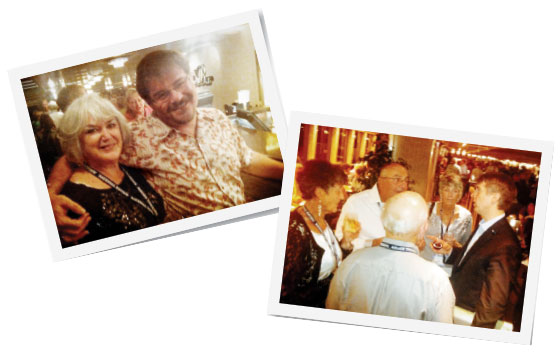
He recommended investing in real estate in another country, maybe in Central America somewhere. A woman to Kay’s right wrinkled her nose: How about a Western country? “Okay, if Europe is what you want, go to Poland,” he said optimistically. “Go to Krakow, buy a house for $50,000, and it’s going to be like Paris in a few years.”
As we drained the Pinot Noir, Hassett gave his audience the insider’s view of the Romney campaign, describing how its election-monitoring software crashed on November 6 and Obama was probably behind it, “because those guys are so evil.”
The table grumbled in assent.
“The thing we have to understand is, these are people who don’t have any morals,” said Hassett. “They’ll do anything. I’m one of their No. 1 targets. I mean, they really want me bad.”
“Well, you’re safe on this ship!” said Bobbie boldly.
Then Hassett pivoted to the liberal media. “I actually think that Goebbels was more critical of Hitler than the New York Times is of Obama,” said Hassett, tucking into a piece of strudel. “I was in the middle of the fight against the propaganda, and I have stories like you wouldn’t believe. These people are so evil. They’re basically Fascists. It’s unbelievable.”
The audience seemed to listen raptly to this soliloquy—who aboard would argue?—but underneath there were currents of dissension. At breakfast the next day, I ran into Kay from Old Greenwich. Tall and stern, legal thriller clutched to her breast, she narrowed her eyes and complained that Kevin Hassett was too controlling of the conversation the night before and lacked social graces.
We arrived the next morning at Half Moon Cay, a small private island 100 miles south of Nassau that promised Jet-Skiing, parasailing, snorkeling, and a glass-bottomed boat. But it was to remain a mysterious green lump on the horizon: The seas were too rough for passengers to get into the tenders needed to go ashore. “Nature was not on our side,” announced Captain Vincent Smit over the intercom.
Instead, the cruisers milled around the cafeteria, lounged by the pool with their Grishams and Balduccis, or surfed the Internet in the Crow’s Nest lounge, a privilege that cost $1.25 a minute.
Then, at 3 p.m., the group gathered into the Showroom at Sea, a three-tiered amphitheater decorated in a bright-red Art Deco style, for the first of several sessions deconstructing the loss. Onstage were Reed, now in lime-green pants embroidered with pink swordfish and navy polo shirt with white piping on the collar; and Scott Rasmussen, the pollster who consistently overrated Romney’s chances of winning the election. Rasmussen blasted the assembled Republicans with one crushing statistic after another. The exit poll data, he said, “create a negative brand image of the Republican Party as a party that only cares about white people.”
The audience murmured unhappily.
“And that image is hurting among the youth,” he continued. “It is hurting across the culture. It is something that has to be addressed across the party. It has to be addressed. You can’t just wish it away.”
Reed expanded on the theme. “You can’t run and win a national election in an electorate that is becoming decreasingly white and increasingly minority and lose 80 percent of the minority vote,” he said. “That math just doesn’t add up.”
Rasmussen offered some friendly advice about approaching minorities. “You show them that you really care, you talk to them as grown-ups on a range of issues, you get them involved,” he suggested, “and you accept the fact that it’s a long-term investment. And you accept that you can learn as much from them as you can teach them.”
This was harsh medicine to reluctant patients, and afterward some of them made their discomfort known. “That depressed me!” one woman said. To my right, a man snapped, “That’s bullshit!”
The man was Bing West, former assistant secretary of Defense under Ronald Reagan, a former Marine and a National Review contributor.
West, mocking Rasmussen, said: “If you stupid Republicans weren’t so goddamn bigoted you would have won the election!”
His wife, Betsy, who bears a resemblance to Nancy Reagan, patted him on the back and apologized on his behalf, saying, “I don’t know why he said that. He’s usually not like that.”
After a coffee break, we reconvened for a panel titled “Econ 1: The State of the Economy.” A large National Review placard hanging onstage swayed back and forth as the boat rocked. A moderator asked the four guests if they saw any signs of optimism in America’s economic future. There were no takers. Hassett said the national debt was like a monkey on America’s back, except there weren’t enough steroids to create a monkey that big. The debt, like an evil monolith, seemed to shadow the brows of everyone there, precisely quantifying their apocalyptic fears. America, by rejecting them, had rejected math itself, they felt, and therefore reason, and therefore reality. Their emotions, in casual conversation, in dinner patter, and in the panel discussions, ranged from sputtering anger to resigned fatalism, often in the space of minutes. As a 91-year-old from California (and nine-time National Review cruiser) told me as he lounged with a spy novel, “I think we’re going to go into the toilet, and I don’t think there’s anything we can do to stop it. We haven’t seen anything yet as far as the recession is concerned … Heck of a thing to look forward to!”
After dinner was a program called the “Light Side of the Right Side.” A frenetic, tightly wound man named James Lileks, a National Review columnist from Minnesota, warmed up the crowd with one-liners: “If we can put a man on the moon, we can put 50 million Democrats up there as well!”

Rob Long, a conservative Hollywood TV writer behind a TNT show called Sullivan & Son, said the party has to accept that it’s been living in a fantasy world. “It’s like The Matrix,” he said. “You can continue to live in the dream world, or you can take the pill and we can unplug you and you can see that things are actually kind of bad.”
Conservatives, they felt, needed their own cultural voice—a Letterman, a Leno, an SNL, a 30 Rock—to compete with the overwhelming liberal dominance of the culture. As the Republican image stood today, said Lileks, “we’re the stupid people, we’re the yokels, we’re the dumb, we’re the racists, we’re the hicks, we’re against everything that’s hip and cool.”
Jonah Goldberg attempted a note of optimism, garnering hearty applause when he said conservative ideas were “still salable because, A, they’re correct. Two plus two is four. You have to believe that we’re going to be proven right by reality.”
In response, the moderator recounted the litany of dreary statistics from Reed and Rasmussen earlier that day. “So therefore we should give up and burn our passports and stay on this boat forever?” said Goldberg with real exasperation.
The crowd erupted in cheers.
We were circling Cuba. Kay from Old Greenwich was doing the backstroke in the Lido pool as cumulus clouds hung over the hazy green hills on the horizon line. A fat guy in sandals wandered by wearing a CLUB GITMO T-shirt. Steel-drum music was percolating through hidden speakers, and the Caribbean was so surreally blue it looked like a giant toilet-bowl puck had been thrown in to color it.
After two days, I was finding the National Review cruisers to be generally courteous and warm, old-fashioned and good-mannered, and responsive to good manners, too. In prolonged conversation, none felt it appropriate to ask what I did for a living. When I did reveal I was from New York Magazine—from the bluest city in the country—I was first met with quizzical stares but then cordial acceptance. The non-Beltway cruisers were particularly curious about the man they would come to refer to as “the mole.” A few took the opportunity to grouse to me about their liberal children, who seemed to bring them genuine disappointment and confusion. Others simply enjoyed talking to somebody under 50. I would come to enjoy my conversations with a 90-year-old named Dick from Connecticut, a veteran of World War II, who would call me to his poolside table for help on the New York Times crossword. “A Palestinian political party that’s not Hamas or Hezbollah,” Dick asked.
Fatah?
“That’s it!” he wheezed. “I always joke that it rhymes with fatwa!”
At other times, things got a little too old-fashioned for comfort. I met a man near the railing who was there as a caregiver for a 70-year-old National Review cruiser from Palm Desert, California. He was gay and seemingly liberal and had come on the cruise only to push his boss around in a wheelchair. As he smoked a cigarette, he recounted a conversation the two had about the ship’s largely Indonesian and Filipino staff.
BOSS: You notice none of the workers are white.
CAREGIVER: Except the managers upstairs.
BOSS: Well, that’s the way it should be.
There were, to be fair, two black National Review cruisers, approximately three Indian-Americans, and two Korean-Americans. The latter were John Yoo, the former Bush Administration lawyer who helped formulate its theory on torture, and his mom. “My mother is a geriatric psychiatrist,” he noted during a panel, eliciting a burst of laughter from the silver-haired crowd before he could finish the punch line. “I thought after the election this could be really good for the family business.”
In person, Yoo was charming and funny, widely praised by his co-cruisers for having tangled successfully with Jon Stewart during his sit-down on The Daily Show three years ago. Yoo worried that the Republicans were too quick to blame each other, saying, “This is all out of Lord of the Flies and Karl Rove is Piggy and we’re supposed to all chase him around with spikes and throw him on a fire?”
After a break for cookies came the 4 p.m. panel, “The Media: How Deep in the Tank?” Lileks, the energetic Minnesotan, was apoplectic that the mainstream media castigated Michele Bachmann for suggesting without evidence that Hillary Clinton adviser Huma Abedin’s had connections to the Muslim Brotherhood.
Eventually, the subject turned to the right’s need to get outside its own media bubble, which had helped fan the fiction that it was going to win the election. Michael Walsh, a conservative writer, said Fox News was “incredibly tiresome” and needed to boot Sean Hannity. During the Q&A, a woman asked about her favorite on-air personality, Mike Huckabee. “He reminds me of Elmer Gantry,” said Walsh, referring to the con man played by Burt Lancaster in the 1960 film. “I don’t take anything he says seriously. He’s another person who should be off Fox, by the way.”
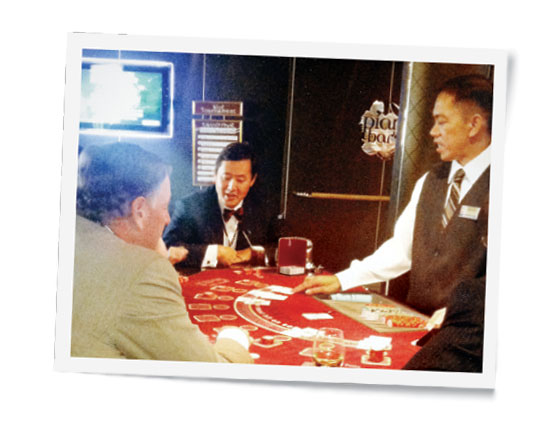
“I disagree with that!” a woman next to me yelled, storming down the aisle with her hand in the air. “Excuse me! Excuse me! I disagree with that!”
Just as she was going for the microphone to amplify her complaints, the panel moderator looked at his watch and declared: “I hate to end this party, but we have to be out of here, thank you very much!”
The last event before cocktails and dinner was a lecture by Deroy Murdock, the only black National Review speaker. It was a curious outlier on the agenda, titled “How the Music of Memphis and Motown Helped Bury Jim Crow,” and set in a smaller, more intimate venue midship. Murdock was wearing a red satin dinner jacket and a black bow tie, presumably to look like a Motown singer. About 50 people attended, sitting on white leather lounge chairs, and there was a Rolling Stones tongue logo on a screen behind him as he cued up “Brown Sugar” on the sound system.
Murdock got the all-white crowd clapping along, including the venerable neoconservative intellectuals Norman Podhoretz and Midge Decter, who smiled broadly.
“Brown Sugar! / How come it tastes so good?”
When the music faded, Murdock, in a studious tone, read from his prepared notes: “It’s only rock and roll, but we like it!”
In his reading of racism in America, Murdock highlighted Franklin Delano Roosevelt, who he said promoted segregation in 1916.* “He, of course, went on to great fame and fortune afterward,” he observed.
The Democrats, explained Murdock, have been “very active in keeping black people down” from 1860 to … 2012. “Go ahead and applaud if you agree with that,” said Murdock.
The audience sat up and clapped hard.
Land ho! There were multiple Shore Excursions available to cruisers in the port of Ocho Rios, Jamaica, though many older cruisers I spoke with wouldn’t go ashore because of horror stories they’d heard about violence and robbery. For the intrepid there was the outing to a waterfall ($79.95), or lunch on an old Colonial plantation (“A Taste of Jamaica,” $99.95). A lot of people went for the plantation, which cruisers later described as rundown and serving bad food. “Jamaica is a dump!” complained Veronique Rodman, a spokeswoman for the American Enterprise Institute.
“It’s only good if you’re at a resort,” added the wife of one of the National Review columnists.
That night, Cal Thomas, a USA Today columnist and Fox News contributor, was the host of my table of eight. At an earlier panel, he’d suggested that his audience “starve the beast” of government by refusing to pay income taxes; but now his stage fire had waned, and he looked bored, peering around our table with half-lids, his hound-dog face propped in his hand. I sat next to a retired surgeon from California named Duane, who heralded the Dinesh D’Souza film 2016: Obama’s America as the definitive truth regarding Obama’s anti-Colonialist background, which now portended America’s inevitable slide into socialism. Thomas liked the movie but dismissed its impact on the election, saying it had preached to the converted and had “sourcing problems” besides. But Duane, who has thick glasses and a closely shorn flat-top, was undeterred, insisting it was relevant. “I disagree!” he spat.
This was a phenomenon that was common on the cruise—the conservative pundits and columnists from the National Review attempting to gently disinter their followers from unhelpful conservative propaganda. For people who believe in the truth of works like Dreams From My Real Father, a conspiracy-theory documentary that argues that Obama’s real father was a communist propagandist who turned Obama into a socialist Manchurian Candidate, this could be difficult work.
As Thomas downed the rest of his drink, Duane said the only way out of the current quagmire is a “revolution,” citing the famous Thomas Jefferson line about watering the tree of liberty with blood from “time to time.”
What kind of revolution did he have in mind?
Duane’s eyes crinkled into a big smile. “You ever heard of guns?”
His wife sat up: “How do you like the veal?”
“It’s awful,” Duane growled, poking at it. “I can’t hardly chew it.”
*This article has been corrected to show that Roosevelt promoted segregation in 1916, not 1936.
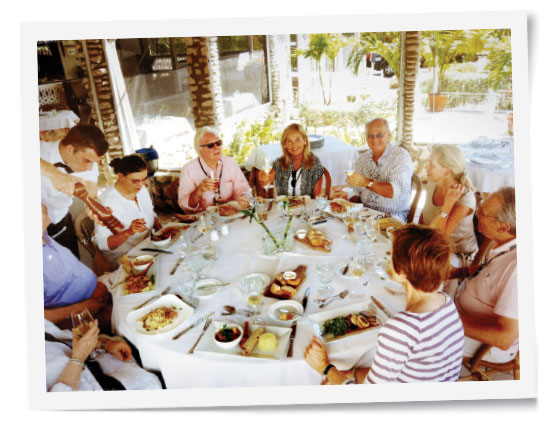
The first thing you see when you step onto the dock on Grand Cayman, the largest of the Cayman Islands, is a two-story Margaritaville, Jimmy Buffett’s chain restaurant, decorated in neon parrots.
The night before, I’d been invited to lunch with John O’Sullivan, a British columnist for the National Review who is white-haired and speaks in a compellingly slow and erudite Queen’s English, often about the dangers of “Islamists.” He lives in Alabama with his wife, Melissa, who has the lilting accent and winsome charm of a southern socialite. She asked me with genuine concern about the problem of Muslims owning all the taxi medallions in New York City. “How the hell did that happen?” she asked.
With six other cruisers, we ventured to a restaurant called Grand Old House, recommended to O’Sullivan by Richard Rahn, the supply-side economist who helped bolster the Caymans as a tax haven for people like Mitt Romney. It’s a Colonial-style restaurant that might make a good set for a movie about nineteenth-century plantation owners: a view of the Caribbean through white columns, complete with rattan furniture and slow-moving ceiling fans carved into the shape of palm leaves.
Over tuna tartare and caviar and a bottle of 2008 Byron Chardonnay, O’Sullivan, wearing a pink oxford and Wayfarers perched on the tip of his nose, discussed issues as diverse as modern slavery, Hispanic Catholicism, male prison rape, and the preservation of “the Anglosphere,” which he defined as the former British colonies “who use English as their common means of communication.”
During a discussion of Iran, a tall, jovial foreign-policy columnist named John Thomson was shouted down by everyone at the table for calling Barack Obama “an intelligent man.” “He’s not with us,” whispered a woman named Nancy from Key Biscayne.
I casually mentioned that the phrase “Anglosphere” was perhaps unfortunate given the right’s image problem as a majority white party. O’Sullivan agreed they might need a different word.
“We haven’t done our marketing that well,” conceded Thomson. “That was Mitt Romney. Mitt Romney messaged whiteness. That was one of his greatest failings. ‘I’m a white Anglo-Saxon.’ ”
Melissa O’Sullivan, the Alabaman wife of John, wasn’t buying the idea that Republicans had alienated minorities. “We’ve invited them to join us!” she insisted.
Susan from Princeton granted that the Republican Party is “lily white and it’s a problem and it is messaging and Mitt Romney screwed up royally.”
But Ms. O’Sullivan again took umbrage. As everyone went silent, she recalled a conference she attended in Australia in which a liberal nun (who “didn’t even have the decency to wear a habit”) criticized America for its “inner-city racism.” Offended, Ms. O’Sullivan recounted what she wished she’d said to this nun:
“Pardon me, madam, but I have been in your country of Australia for ten days and the only Aborigines I’ve seen have been drunk on the street, and at least if we were in my country they would be serving the drinks at this conference!”
Ms. O’Sullivan then warned against watering down the purity of the conservative agenda to placate minorities or, as she put it, rather succinctly, “the bastardization of the product.”
Under the shade of some palm trees, Ralph Reed took off his shirt and fed an orange to a giant iguana.
Day five, Friday afternoon, and we were on a white-sand beach in Honduras, biding our time until a boat would take us offshore to snorkel over the shipwreck. Even Reed, among the youngest people on the cruise, was in a way a figure from an earlier time. Rob Long, the right-wing Hollywood writer, told me the night before, over cocktails on the midship deck, “I like Ralph Reed, but he’s done.”
“We lost,” Long continued during a long interview over coffee later that week. “We are losers.”
Which meant they must necessarily compromise. The C-word I heard nowhere else onboard during this cruise, except from Long, the self-appointed Cassandra who told the crowd the night before that “our operatives are incompetent and we live in a dream world.”
“That’s what losers do, they compromise,” Long told me as Freddie Mercury belted out “Somebody to Love” over the cafeteria sound system.
On Saturday morning, I found myself in a hot tub with Dorothy from Utah. Late seventies, short hair, nice tan, sparkly blue eyes. Her husband collapsed in the heat in Jamaica, and she was monitoring him while he ate breakfast under an umbrella. Dorothy voted for Romney and was so devastated when he lost that she spent the day after the election praying for America.
It was hard to lose. And losing didn’t always bring out the best in people. They were struggling to comprehend the rejection, to understand how it had come to this. As talk turned to her family, Dorothy lamented the misfortunes of her oldest son, who she said was stolen from her by “the seventies,” which was her code for drugs. She had grown up in the early fifties and was utterly bewildered by the sixties, ill-equipped to navigate the cultural upheaval. At 58, her son was now divorced and unemployed, living in various campsites, and she didn’t know who to blame. I saw tears on her cheeks and I put my hand on her shoulder. “I’m afraid,” she told me. “Write that. We’re scared to death.”
Indeed, that sense of fear was everywhere on the ship, fear of an impending debt crisis that would crush all fortunes, fear that the Anglo majority was now marginal for the first time in their adult lives, fear that the country the cruisers once knew had fully given way to something more … diverse, foreign, incomprehensible.
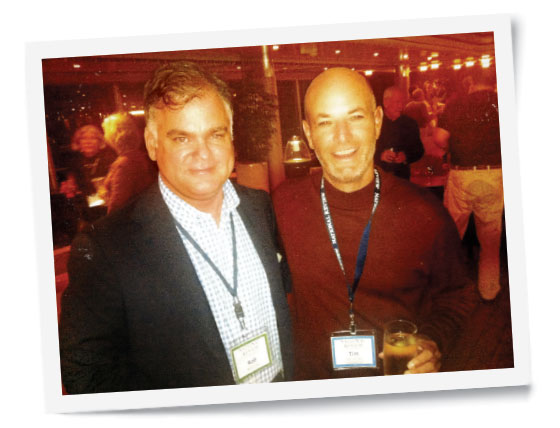
A steady downpour started in the afternoon as we motored through steel-gray waters back to Florida. Tomorrow would be a new gray dawn in America. Up in the Crow’s Nest, the rain pelted on the windows as Jonah Goldberg, having just finished a panel about the scurrilous designs of the left, slumped on a couch, loosened his tie, and sighed. He had won $200 at the craps table with John Yoo last night, but now he was tired and ready to go home.
“This is a more downbeat bunch this year,” he said. “We lost in 2008, but it was almost boisterous and fun. This, a little less so. People were dyspeptic.
“Their conception of what the country is about, they really were sure the country would reject Barack Obama,” he continued. “I do think it hits them hard. The fear I have, why this election stung, I think, Obama has successfully de-ratified some of the Reagan revolution in a way that Clinton never could and didn’t even try to. That’s what freaks people out, that feeling in their gut, either Obama has changed the country, or the country has sufficiently changed that they don’t have a problem with Obama. That’s what eats at people.”
It was the last of the cocktail mixers on the Lido deck. The National Review speakers, including Rich Lowry, the magazine’s editor, who flew into the Caymans to join the cruise halfway through, seemed relieved to have it end. “We don’t do this for fun,” he admitted.
On the leeward side of the Nieuw Amsterdam, John Yoo stood next to his mother, Sook Hee Yoo, a small, elegant Korean woman in black-framed glasses. She described herself as nonpolitical, an objective observer. And she had a diagnosis.
“To protect the ego, you have a defense mechanism: denial and projection,” she told me as her son leaned in to hear over the party din. “You deny your problem, saying it’s your fault and not mine. Instead of projection, blaming other people, we have to think of a positive solution. But I didn’t hear that yet.”
“They are still grieving,” she concluded as her son winced and began to break in, fearing she’d gone too far. “I hope not for more than six months. The grieving process should only be six months. If it goes on for more than six months, it could go into a major depression.”